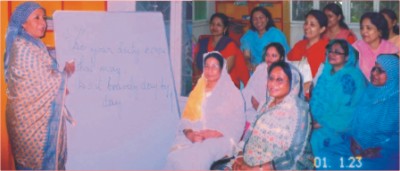Going Global
Study Abroad Website ‘Global Campus’ Comes to Bangladesh
Turfa Tasnim and Farnaz Karim
"Connecting talented students with global education opportunities” is the idea behind GlobalCampus. This is an innovative website that is changing the way students from developing countries approach universities. The CEO, Mr. Maurizio de Franciscis visited Bangladesh from 4 to 8 April, 2010 in a series of meetings and events organised by the Bangladesh Chapter of AIESEC, the world's largest student organisation.

Until now, students wishing to go to a foreign university for higher studies would select few colleges to approach, submit their application and wait. Some would go on to gain admission, others would not, and the luckiest among them would also get a scholarship. Parents wishing to send their children abroad often pay local intermediaries in the hope of increasing their chances of admission into a prestigious foreign university.
This may all be about to change for good. The CEO of GlobalCampus, Mr. Maurizio de Franciscis, was in Dhaka to meet some of our leading national figures in education and explain how his organisation is working with Ministry of Education, high schools and universities in 12 countries to help students get access to global universities. They have an ambitious goal: changing the world by helping our best talent emerge. 
GlobalCampus is a young website, having launched a year ago after a preparation phase that involved Oxford, Georgetown, Darden, Notre-Dame and other top universities in the world. It is already used by over 35,000 students in the best schools in India, Pakistan, Nigeria, and Ghana and adopted by universities in the USA, the UK and the EU. The Ministry of Education of Spain, Finland, Ghana and Rwanda are its partners, and companies like Microsoft and DHL are using it to identify talented students for their global sponsor-to-hire programs.
GlobalCampus works like a talent scouting tool for universities. It uses the Internet to make all students visible, enabling the institutions to invite for admission the most talented among them. Students, from high school to graduate level, can create a free personal profile on www.globalcampus.com and use it to present their educational achievements and their academic aspirations to many of the world's best universities. They can even add personal articles and videos. International universities use GlobalCampus to identify and contact students they consider to be most interesting and offer them places in their programs. The website also uses the information entered by students to notify them of scholarships that match their individual profiles. This increases their chances of a successful enrolment.
Thousands of students in emerging countries have been contacted by universities through GlobalCampus. Many of them will go on to start their education abroad in September. Charles Odoom in Accra, Ghana, is one of these students. He was short-listed to receive an exclusive full-tuition scholarship worth 33,000 Euros to do his MBA in Europe.
The main limit of the old approach, as Mr. de Franciscis explained, is that students missed out on some of their best opportunities. It is simple math: a good student applies on average to 3 to 8 colleges and for scholarship opportunities. Even if we consider only the top 30 institutions in the world that means missing out on over 70% of their college admission chances, there are hundreds of outstanding universities out there. Some excellent education systems like that of Finland, which offers 280 degree courses in English completely free of charge, get completely overlooked because they don't spend big money in global branding.
When we include scholarships, the missed opportunity is even bigger. There are many scholarships on offer from colleges, foundations, companies and governments around the world, Mr. de Franciscis explained, so even the most dedicated students are only aware of a fraction of them. The result is that every year an astounding number of these scholarships remain unclaimed. The UK OFA estimates that in 2007 over 19 million Pounds of need-based scholarships and bursaries went unclaimed, and UNESCO estimates that as many as 200 million dollars in study grants may remain unclaimed globally every year.
During his visit in Dhaka Mr de Franciscis met officials of some universities and schools of Dhaka and also notable personalities outside the academia. Together they dispelled the myth, widespread among many parents, that only the world's best known universities can open a bright future for their children. GlobalCampus has the potential to open more windows of opportunity to the students of Bangladesh.
(Turfa Tasnim is a student of School of Business, North South University and Farnaz Karim is a student of Economics, North South University)
INSET (Teacher Training Programme) At Marie Curie School

MARIE Curie School organised two training programmes in March and April 2010. Shameem Azad, noted Poet, Teachers Trainer and Media Personality conducted the “INSET (In-service Training)” Programme. She talked on classroom management, discipline and motivation of the students.
Another “Teacher Training Programme” was arranged at the same venue of Marie Curie School Najma Shams, ELT Professional and Examiner of British Council conducted the training course.
Marie Curie News
THE New South Wales University / Education Assessment Australia in collaboration with Macmillan Publishers India Ltd. organised an “International Assessment for Schools (IAS)” in Asia in 2009. Amongst the 14 countries of this region, Ahmed Fuad Ali, student of class V and Tiba Nazifa, student of class VIII of Marie Curie School became the regional toppers in English and Mathematics respectively. It may be mentioned that 207,683 students of 2,631 schools participated in this assessment and the UNSW Gold Medals were awarded only to 103 students (0.05 percent) from 68 schools. Marie Curie School was one of them. All the members of Marie Curie School family congratulated them on their outstanding performance.
| 